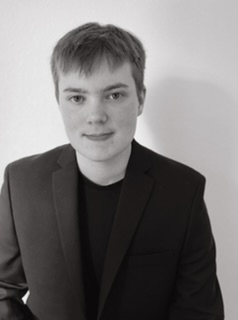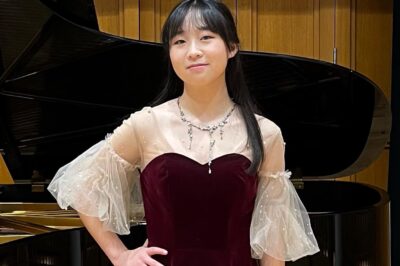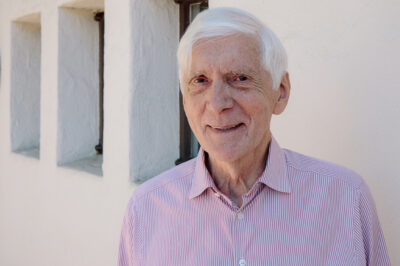Ferris Haukom

Ferris Haukom is a composer, conductor, violinist, and violist who is also interested in physics, entrepreneurship, and computer programming. Ferris first enrolled at PCM in 2018 and has studied violin with Elizabeth Hedman and viola Artist-Teacher Andrew Picken, as well as chamber music. Ferris has played with the Pasadena Youth Symphony Orchestra and currently studies composition with Jordan Nelson. He is also a participant in the LA Phil Composer Fellowship Program and attends the Sunset ChamberFest’s young composers workshop every summer. Ferris studies conducting with Maxim Eshkenazy and David Cubek.
Recently, Ferris shared his thoughts on composing, conducting, and his time here at PCM, as well as some exciting projects on the horizon.
When did you start composing, and what got you interested in it?
I have always loved music and creating and writing simple melodies. I started playing piano when I was 5, and although I only played for a year, I learned how to read music and preferred sketching out songs to actually learn repertoire. A few years later, when I was about 12, I started studying composition with Jordan Nelson, who helped me evolve past short, rudimentary ideas and start composing properly. I am still studying with him today. One of the most appealing aspects about composition (and conducting) is that it fills in my understanding of all aspects of music and gives me a new perspective on music. I have always needed to learn everything about a subject before being satisfied with my level of knowledge, so composition was another item that I felt I needed to understand before I could be content with my level of immersion in music. It also happened to be one of my favorite elements, especially because it is the hub of the music creation process.
Similarly, when did you start conducting and what got you interested in it?
I started conducting when I was about 13. I was in the Colburn String Orchestra and I saw the school’s conducting class being advertised. I had no prior experience with conducting, but it caught my attention and I decided to join. It quickly became one of my favorite extracurriculars. I especially like how it serves as a link between composition and performance, being a performance itself, but also a live construction of music and an individual interpretation of the music — a combination of recital and creation. But after all, this is also a bit of a self-aggrandizing statement of a thought process that conductors use to help themselves accept the triviality of their role and the fact that the orchestra could function perfectly well without them.
How do your logical interests like physics and programming inform the way you think about music? Does it influence your composition and instrumental performance?
It definitely has some influence on my composition, but that influence varies depending on the type of music I am trying to write. Frequently it is refreshing to abandon analytic thinking and create melodies spontaneously, especially with aimless improvisation, but I almost always use theory and strategy to create harmonies, sometimes to the detriment of the music. While it is helpful in many cases, I often find myself stuck in loops of predictable progressions and uninspired, pointless music, especially from making “logical choices” and following conventions. This is a bit of a restrictive view on “logical thinking,” however, and I have been recently working on trying to devise new, or at least somewhat less hackneyed ways of creating sounds and moods with “analytic thinking.”
What would you say to students who are interested in learning how to conduct or compose?
For those who want to compose, keep your ideas. I keep a notebook of fragments of ideas, so I can choose one to expand when I start a new fully-fledged piece. Having content (be it melodic, harmonic, effects, soundscapes, or anything) is an immense aid in figuring out where to start and how to create a piece. Written notes are easiest to browse and reference, but making recordings of sung segments or ideas being played on your instrument can also be massively helpful for preserving character that may be lost in trying to translate the music onto paper.
For those who want to conduct, familiarize yourself with scores. You can buy scores (Dover Mini editions are usually quite good and reasonably-priced) or download them from IMSLP. Practice reading the score while listening to the piece and get comfortable with foreseeing entrances of new instruments, tempo changes, time changes, etc. and sketch in the score the shapes of each phrase as well as where each one starts and ends. This is probably the most difficult, or at least labor-intensive part of conducting — figuring out what you want to convey once you get to the hand-waving stage.
What are your current goals as a musician and composer?
My current goal as a composer is to create music that represents a number of different worlds. I tend to consider everything in terms of worlds, or packages of visual spaces paired with sound, so I have recently begun to explore how to evoke these visuals through sound. I would also like to expand my methods of composing, including collaborations with other composers and musicians.
Do you have any current projects that you are excited about?
I am currently working on quite a few projects, including a vocal ensemble piece and a collection of ambient piano pieces. I am excited about the vocal ensemble piece because it is allowing me to create a more massive and powerful type of music that has always interested me, but it also has the added obstacle of text-setting. The piano project is something I have wanted to do for a few years, but I hesitated because it isn’t the most technical display. It is based on a series of recordings of short piano improvisations I have been collecting over the years, but my primary challenge for this piece is the sound. In most of my compositions I am fairly detached from the actual performance and the goal is to convey everything through the written music, but since these pieces are meant to sound improvised and allow sound to accumulate in the performance space in a specific way, it is much harder to capture on paper. This has also raised my interest a bit in recording and sound design. These are the two projects I am focusing on over the summer. During the year, I am in the LA Phil Composer Fellowship Program, so I am also, of course, looking forward to the challenges posed by the CFP this year. Being in the program this past year has been one of the best and more rewarding experiences of my life and I am very excited to continue in the future. It has connected me with so many fantastic composers, both peers and mentors, as well as musicians and I believe I have grown immensely both as a composer and in the way I consider music in general during my time in the program.
At PCM, you studied with Andrew Picken and Elizabeth Hedman. Did you have any particularly impactful experiences or learn any important lessons from them?
It has been fantastic working with both of them. Mr. Picken helped me zoom in on my technique, which helped me learn to fix issues at the root, the most fundamental level. This has been crucial to my playing and has helped me learn to establish a solid foundation so that repertoire work in the future can be focused on the music instead of the basic technique. I especially enjoyed our in-person lessons and sight reading duet practice.
One of the most important lessons I have learned from Ms. Hedman is how to practice — she has helped me to be able to identify the successes and places for improvement, to know how to fix the issues, and to execute it and actually repair them, all while maintaining a positive outlook and not only focusing on what is wrong. In addition to technical advice, she has constantly been incredibly supportive and an excellent person in general. I am very glad to be studying with her.
Is there anything else you’d like to share with the PCM community?
Thank you for the many years of music and support!



